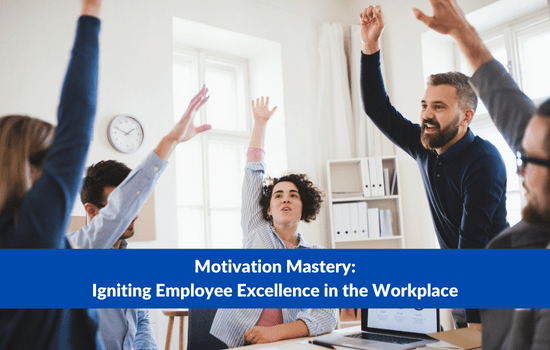Are you wondering how to motivate, engage, and influence employees? Leaders can implement these seven critical strategies to move their team's performance from good to great.
Cultivating Excellence: Inspiring Your Team to Peak Performance
You can cultivate excellence within your team. One of the biggest challenges employers confront is to motivate employees to arrive at work engaged and ready to give their best performance. Leaders continually seek the secret sauce to inspire, encourage, and influence employees to increase productivity.

Did you know that only 15% of individuals feel respected and valued by their employers? If employees don't feel respected and valued, it's no wonder leaders always ask us how to engage, inspire, and motivate employees. The bottom line is that how you make employees feel impacts their performance.
Are Leaders the Secret Sauce to Employee Performance?
Here's what I know – organizational leaders are the main ingredient in the secret sauce. Once they realize how much influence they have to inspire and engage employees, things will turn around quickly. Emotionally effective leaders have the most substantial impact on employees and know how to get the best out of them.
Leaders with advanced emotional intelligence are aware of their surroundings and demonstrate empathy and compassion. Acknowledging others' feelings and addressing challenges by showing they genuinely care, they employ specific emotional and social skills that positively impact relationships. Basically, by leading with compassion, they can relate and interact authentically. - Linda Marshall, President, Marshall Connects
How to Inspire and Motivate Your Employees
I have the distinct privilege of working with leaders who strive to learn how to engage, inspire and positively influence their employees. During coaching sessions or workshops, I share valuable strategies they can practice to build and nurture lasting relationships with their team and consistently enhance performance.
Best Practices To Enhance Employee Performance
- Act with integrity. When you act with integrity, you build trust. Trust is the backbone of any relationship. You want to develop it with each team member. Here's more on how to do this.
- Listen. Employees want to be heard. Keep them engaged through open communication and active listening. Employees who feel their input is valued are more committed to engaging and demonstrating their best work. This post shows how important it is to be heard at work.
- Keep them informed. Keeping all your employees abreast of what's happening in the workplace is essential. Over time, our social awareness increases, and we know when something is up. By communicating regularly with your people, you can reduce gossip and enhance productivity, employee engagement, and overall performance.
- Show your team you care. Show your employees you care about them by checking in with them daily. It doesn't have to be a long conversation, but it must be authentic. Saying hello and seeking eye contact is crucial for engagement. If you walk by and ask them how they're doing without stopping and listening to their response, you aren't demonstrating authenticity.
- Be empathetic. Empathetic leaders can recognize and understand others' feelings and opinions by figuratively walking in their shoes or seeing things through their eyes. Our relationships are deeper and more meaningful when we're more empathetic. Fortunately, empathy can be learned and taught.
- Lead with compassion. Leading with compassion is necessary for all leaders. Leaders must know how to relate and interact with the team. It's also about how leaders authentically reflect upon their conduct and make changes as needed.
- Last but not least. Practice humility. Employees want to support leaders who are humble and vulnerable. When leaders can apologize and admit they don't have all the answers, it is easier for employees to follow, support, and engage with them. Leaders often struggle with vulnerability. But vulnerability is a crucial asset to emotional intelligence.
Above all, emotionally intelligent leaders have fewer performance issues and tend to have more motivated employees. So, start today by reflecting on these skills. Practice the skills you want to develop, one at a time. Before long, motivating your team will come naturally, and you can focus on other areas.
Please reach out to Marshall Connects for support in building these skills. You can increase emotional intelligence by reading The Power of Emotion or taking an EQ-i 2.0: Leadership Self-Assessment. Discover my consulting opportunities and emotional intelligence training. Through continuous practice, leaders gain influence, enhance overall performance and develop engaged employees who bring their best to work to impact the bottom line positively.
This article was originally published on November 10, 2018, and has been updated (January 2024).
More Motivational Reads Here »
How Emotionally Intelligent Are You?
Sign up for monthly tips to build your Emotional Intelligence and reduce Emotional Hijacking!

















